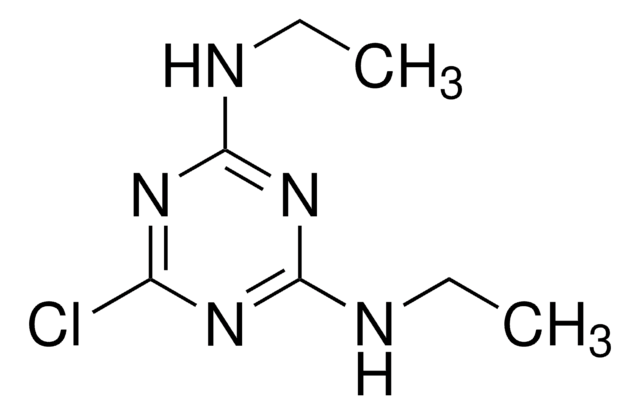46443
Spiroxamine
PESTANAL®, analytical standard
Synonym(s):
N-Ethyl-N-propyl-8-tert-butyl-1,4-dioxaspiro[4.5]dec-2-ylmethylamine
About This Item
Recommended Products
grade
analytical standard
Quality Level
description
mixture of diastereomers
product line
PESTANAL®
shelf life
limited shelf life, expiry date on the label
technique(s)
HPLC: suitable
gas chromatography (GC): suitable
application(s)
agriculture
environmental
format
neat
SMILES string
CCCN(CC)CC1COC2(CCC(CC2)C(C)(C)C)O1
InChI
1S/C18H35NO2/c1-6-12-19(7-2)13-16-14-20-18(21-16)10-8-15(9-11-18)17(3,4)5/h15-16H,6-14H2,1-5H3
InChI key
PUYXTUJWRLOUCW-UHFFFAOYSA-N
Looking for similar products? Visit Product Comparison Guide
Related Categories
General description
Application
Legal Information
Signal Word
Warning
Hazard Statements
Precautionary Statements
Hazard Classifications
Acute Tox. 4 Dermal - Acute Tox. 4 Inhalation - Acute Tox. 4 Oral - Aquatic Acute 1 - Aquatic Chronic 1 - Repr. 2 - Skin Irrit. 2 - Skin Sens. 1 - STOT RE 2
Target Organs
Eyes
Storage Class Code
10 - Combustible liquids
WGK
WGK 3
Flash Point(F)
296.6 °F
Flash Point(C)
147 °C
Personal Protective Equipment
Choose from one of the most recent versions:
Already Own This Product?
Find documentation for the products that you have recently purchased in the Document Library.
Our team of scientists has experience in all areas of research including Life Science, Material Science, Chemical Synthesis, Chromatography, Analytical and many others.
Contact Technical Service











